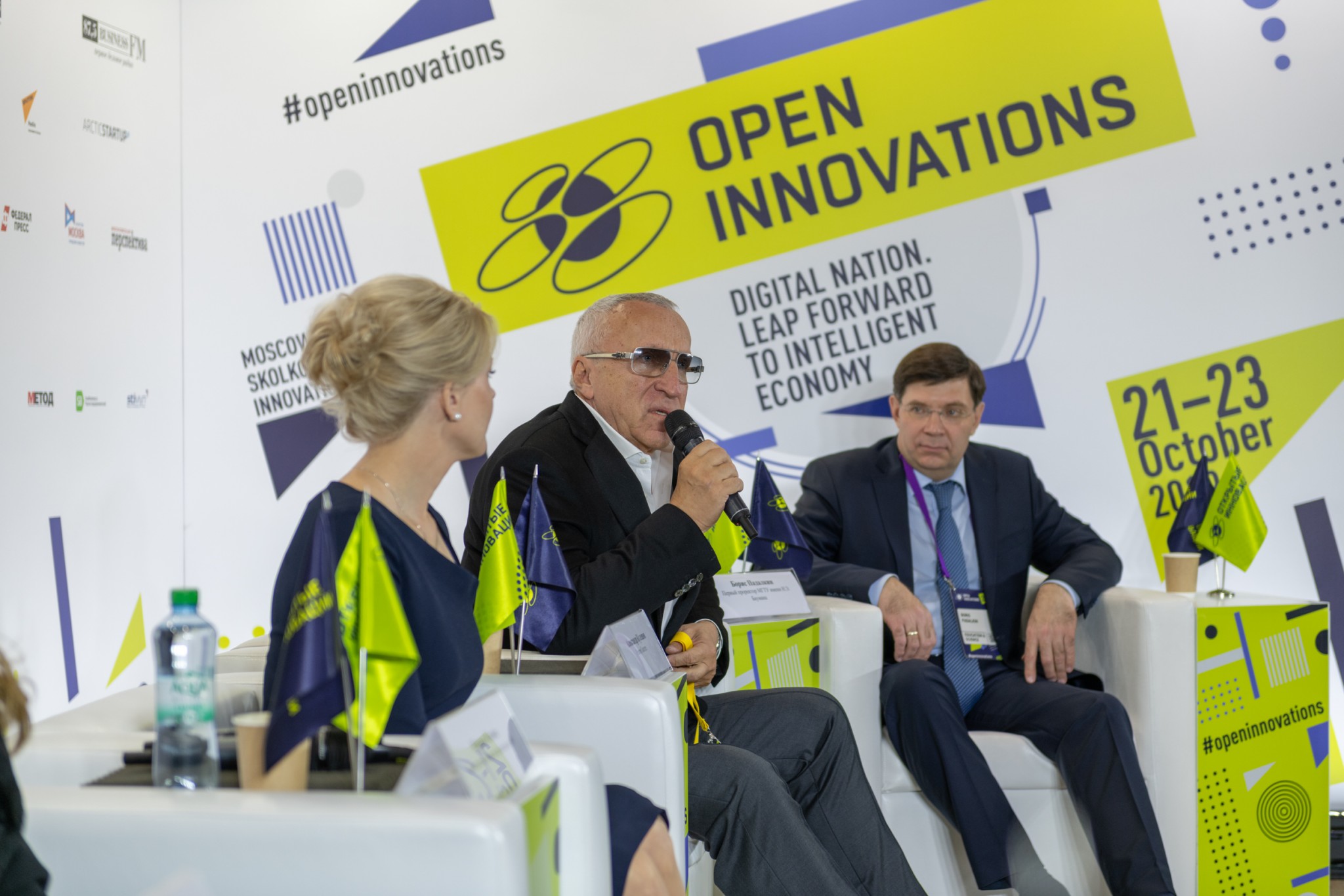The President of the Skolkovo Institute of Science and Technology (Skoltech) and Russian Academy of Sciences academician Aleksander Kuleshov took part in a press conference devoted to the launch of a training school at the “Correspondence School of New Technological Competences” (CSNTC).
Besides Skoltech, this large-scale program for supporting talented students also includes the Moscow Institute of Physics and Technology, Bauman Moscow State Technical University, and the University of Information Technologies, Mechanics and Optics. The press conference was held at the “Open Innovations 2019” Moscow International Forum. Along with the Skoltech President, the project was presented by key representatives: the Deputy Minister of Education of the Russian Federation Marina Rakova; the First Deputy General Director of Innopraktika Nataliya Popova; the First Vice-Rector of Bauman Moscow State Technical University Boris Padalkin; the acting General Director of the Federal State Independent Institution, “Foundation of New Forms of Educational Development,” Maksim Inkin; the Business Development Director and Managing Partner of Skyeng Aleksandr Laryanovsky; and the Director of the Distance Learning School of the Moscow Institute of Physics and Technology (MIPT) Anna Gabdurafikova.
The purpose of CSNTC is to develop new mechanisms for supporting children’s education in the spheres of mathematics, science and technology, and also to further support them for admission to higher education. In partnership with the Rybakov Foundation, this project is being implemented by the Foundation of New Education Development Forms and is supported by the Ministry of Education of the Russian Federation and the non-state development institute Innopraktika.
The key areas for the CSNTC are biotechnologies, robotic technologies, nanotechnologies, information technologies, space technologies, and fundamental science (mathematics, physics, and chemistry).
Skoltech is planning to focus primarily on creating programs in the area of the Internet of Things. This summer, the educational program already underwent its pilot run at the “Letovo” school, where students developed a device for collecting and processing information to estimate the climate conditions in school rooms. This device helps to control and provide the optimum temperature, humidity and lighting in classrooms.
In assessing the first introduction of new educational formats, we can be sure that students in Russia gained a unique opportunity to learn brand-new competences for future professions. The Skoltech President said that “from project to knowledge” is an absolutely right concept. “We are dealing with millennials, and they could be the first generation throughout human history that is arranged differently. Their education should also be different. Feeding a millennial with theories detached from practice is useless. Their need for knowledge shows through the specific projects they choose. Acquiring new skills generates a desire to learn. This is why I personally and Skoltech as an institution fully support the Correspondence School of New Technological Competences. To date, we have selected 23 doctoral students and master’s degree students in the area of IoT who are ready to work on CSNTC projects,” Aleksandr Kuleshov summed up.
In the course of project realization, the Skoltech master’s degree and doctoral students will get a chance to test themselves as teachers. Having become mentors, they are planning to implement interesting projects in the sphere of IoT together with school students.
The education will primarily be online, supported by further professional education institutions, and fitted with high-tech equipment (VR-helmets, 3D-printers, micro-controllers, etc.), especially at children’s “Quantorium” tech parks and the network of children’s centers of IT-creativity, “IT-cube.”
A high school student who has successfully completed the education program at CSNTC, will get additional points for their Unified State Exam. In this framework, it is planned to establish cooperation between tutors, state corporations and real economy companies. It will allow universities to find motivated prospective students and will allow business to attract specialists with strong professional skills and project activity experience in future.
The future mentors will complete the following educational courses: the “Flexible Competencies of Project Activities” online course and the on-campus educational session of the Federal State Independent Institution “Foundation of New Education Development Forms,” which aim to teach universal soft-skills in pedagogical scenario-planning and the specifics of project approach in education.
The project administrators believe that its nationwide scale will promote systemic changes and today’s schoolchildren, as well as their highly motivated mentors from the state leading universities, will become the drivers of the innovation-based economy.
To become a part of the next participants enrollment, visit the portal.
Contact information:
Skoltech Communications
+7 (495) 280 14 81

